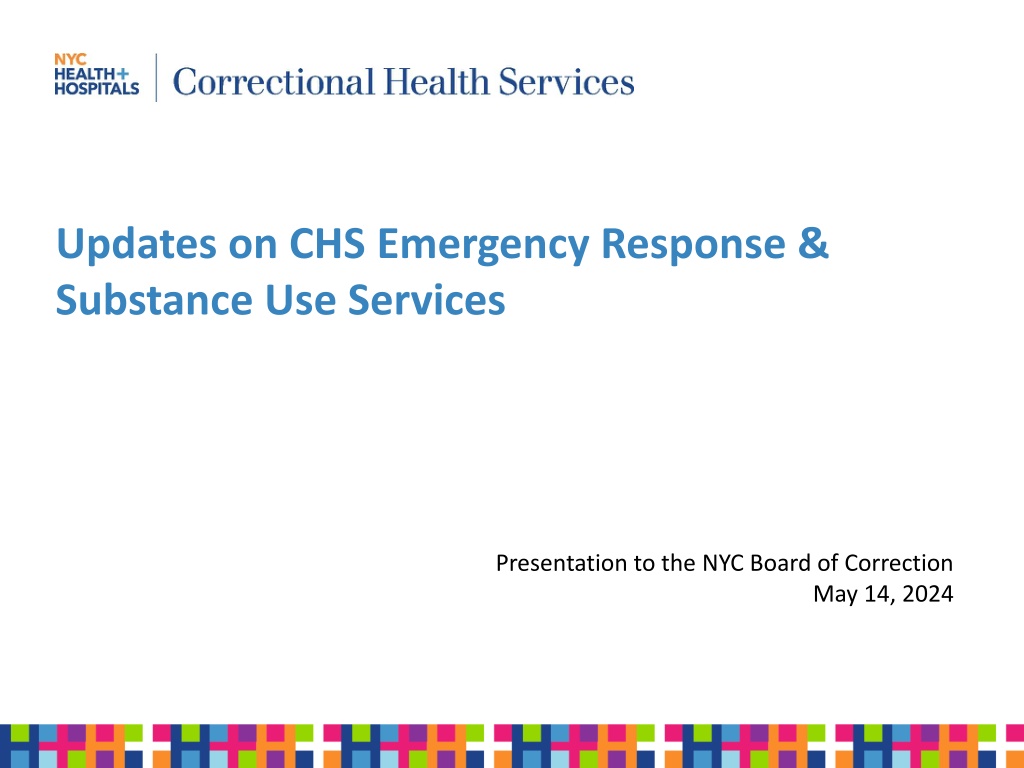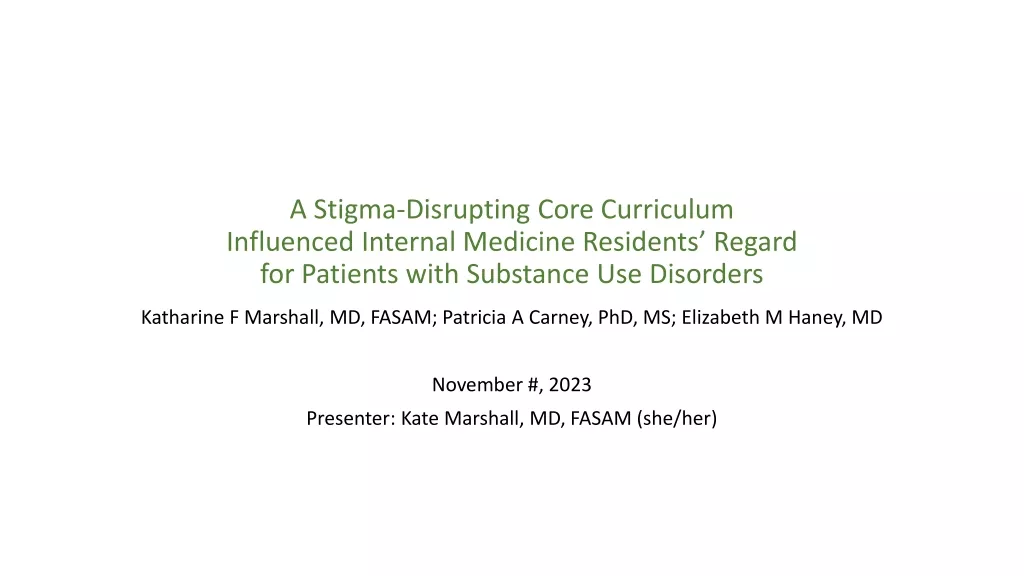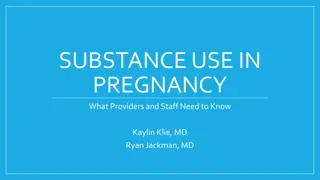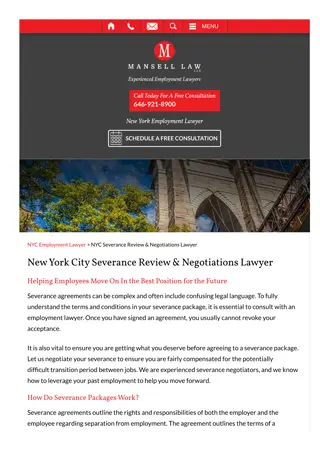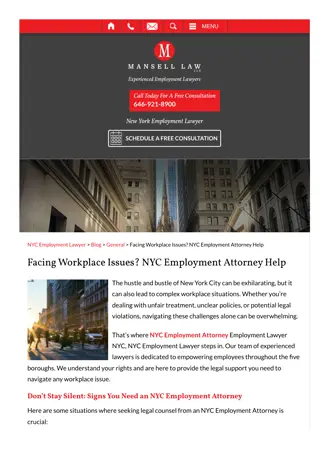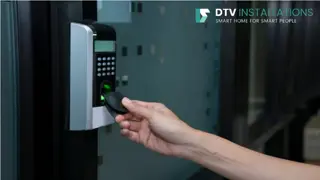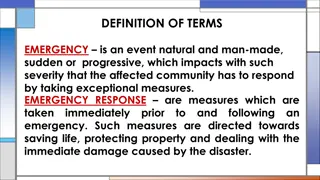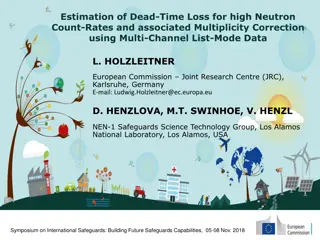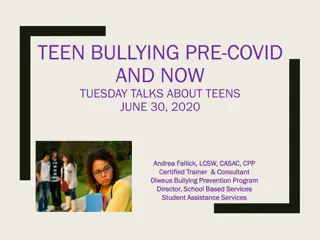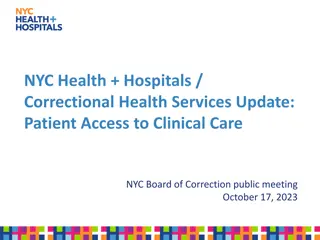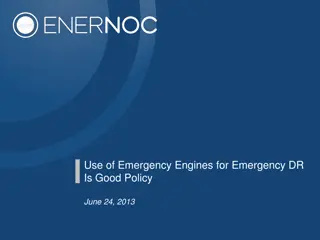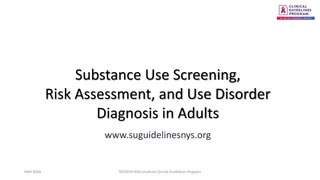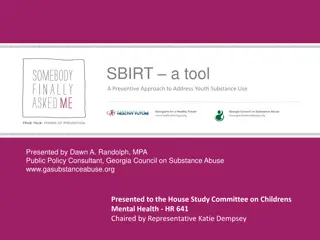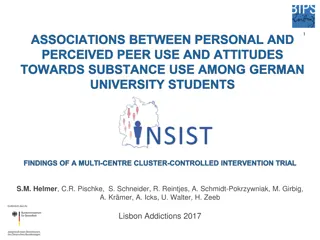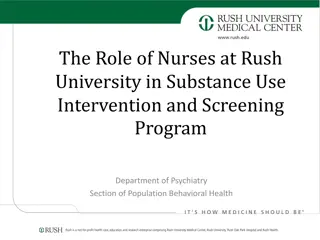Updates on CHS Emergency Response & Substance Use Services Presentation to the NYC Board of Correction
CHS Emergency Response involves a well-trained team responding to emergencies in DOC facilities, with efficient response times and drills for readiness. The Substance Use Services by CHS focus on early disorder identification and treatment, including for opioid use disorders through programs like KEEP. Data from CY2023 shows the volume of emergency responses and success in hospital transfers. Presentation date: May 14, 2024.
Download Presentation

Please find below an Image/Link to download the presentation.
The content on the website is provided AS IS for your information and personal use only. It may not be sold, licensed, or shared on other websites without obtaining consent from the author. Download presentation by click this link. If you encounter any issues during the download, it is possible that the publisher has removed the file from their server.
E N D
Presentation Transcript
Updates on CHS Emergency Response & Substance Use Services Presentation to the NYC Board of Correction May 14, 2024
CHS Emergency Response CHS medical and nursing staff, all of whom must be certified in Basic Life Support (BLS), respond to any incident called in as an emergency by DOC in any DOC facility. Physician staff must also be ACLS certified. The responding clinical team assesses the nature of the emergency and performs all necessary procedures to stabilize and treat the patient.
CHS Emergency Response Primary responders At minimum, BLS trained, can address majority of low-acuity emergencies without further escalation In-Facility backup additional staff to support further escalation for unstable patients, support with communications UrgiCare on-site backup rare, advanced interventions including intubation Hospital run EMS or 3-hour run for non-EMS hospital evaluation
CHS Emergency Response Data In Calendar Year (CY) 2023, there were 4,658 emergency responses. Of these responses, 827 (18%) resulted in hospital transfers, and 229 (6%) of the 4,658 emergency responses resulted in hospital admission. CHS aims to respond no more than 8-10 minutes after receiving an emergency call. The CHS median response time in CY2023 was 6 minutes. In addition to simulations and in-clinic teachings, CHS conducted 22 unannounced, facility-based drills in CY2023, with an average response time of 6 minutes.
CHS Substance Use Services CHS efforts to mitigate the harms of substance use center around the early identification of disorders. This includes a comprehensive screening by both CHS nursing and medical staff for every individual who enters DOC custody, as well as protocols to address withdrawal. In CY2023, of 22,319 new admissions to Rikers, 3,468 individuals (16%) were diagnosed by CHS with an active opioid use disorder (OUD) and ordered prescribed medication for withdrawal or bridge/maintenance treatment.
CHS Key Extended Entry Program (KEEP) Upon intake to jail, new patients with OUD are referred to KEEP, the nation s oldest and largest jail-based opioid treatment program. 96% of these referrals are evaluated by KEEP. Through KEEP, CHS provides primarily methadone and buprenorphine treatment to patients while they are in jail and provides linkages to community-based treatment and harm-reduction services to patients reentering their communities. In addition to treating patients who have opioid use disorders, KEEP clinicians identify and counsel patients who may have experienced a non-fatal overdose while in custody. From April 2023 to April 2024, the KEEP team conducted 178 such sessions.
Medication Assisted Treatment (MAT) CHS methadone dispensing process fully meets regulatory requirements. MAT protocols involve a CHS nurse administering the medication to the patient, with DOC providing support by ensuring that patients do not walk away from the medication window or the clinic setting.
Naloxone In December 2021, CHS launched an initiative to stock every housing unit in the jails with naloxone and to train patients in its use, making Rikers one of the first correctional systems in the country to provide incarcerated individuals with direct access to this life-saving medication. CHS initially trained patients in every housing area in every jail and has continued to train patients as they enter custody, reaching more than 8,000 individuals to date. CHS continues to supply every housing area with Naloxone and replenishes the kits following reported use by DOC, including 186 times in CY23. CHS Pharmacy also conducts a monthly audit of every housing. CHS conducts Naloxone training with: All patients who request training during nursing intake, via HTL, or other means All patients who enroll KEEP All agreeable patients who have experienced a potential overdose DOC recruits during their CHS training day
Naloxone (cont.) CHS publishes on its website monthly data (CY2020-2024) regarding Naloxone and suspected overdose events. In February 2024, there were 36 such events, for a monthly rate of 5.79 events per 1,000 average daily population. Patients can access a Naloxone FAQ on their tablets. CHS reentry liaisons also make naloxone kits and training and fentanyl test strips available to all visitors to CHS Reentry Center on Rikers Island. Since it opened in July 2023, the CHS Reentry Center has distributed more than 10,370 naloxone kits. In addition, CHS provides naloxone kits and training to patients family and friends at the Rikers Island Central Visitor Center and has distributed more than 64,000 kits since 2016.
